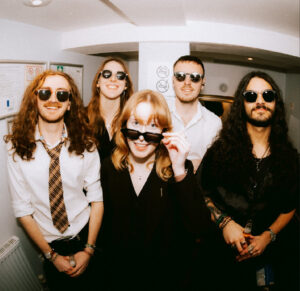THE ELEPHANT IN THE ROOM – NAVIGATING THE IMPACT OF AI IN MUSIC
The rapid movement in AI technologies over the last few years has raised discussion on the prospects of this development concerning the artistic industries. While AI indeed opens exciting horizons for new creative possibilities in so many creative industries, it also puts into question human artists’ very future and makes the authenticity of AI-generated music a huge concern….

AI is here and not only is it slowly tightening its grip on other creative industries, it is working its way into music, but why aren’t more people talking about it?
It is thought by some that AI has the capacity to revolutionise the music industry. Looking at AI music generators, for example, which study contemporary music and then use their findings to create creative songs. This might stimulate new thoughts and assist artists in overcoming creative obstacles. Further, AI can contribute to vocal pitch correction, mixing, and mastering records much quicker and with less expense.
Despite these advantages, there are serious ethical issues related to AI in music. Among the most important is the potential displacement of human composers and musicians. As AI-generated music becomes more common, human artists may no longer have jobs or be able to compete with AI-generated work. Further, there are questions about the authenticity and creativity of AI-generated music. Some would say that AI music lacks the emotional depth and human touch of human composition. Other challenges that may stand in the way of AI include legal and copyright issues of AI music. Most of these AI tools were trained on copyrighted material which straight away causes issues, leading to some lawsuits by artists and publishers.
Back in 2023, Universal Music successfully petitioned streaming services to remove a song called “Heart On My Sleeve” that used AI-generated vocals from their artists Drake and The Weeknd. The song used deep-faked vocals from Drake and The Weeknd, and it quickly gained millions of views on platforms like YouTube and TikTok before being taken down. Whereas it was an absolute disaster concerning legal issues about rights, several further developments happened to cope with AI-generated vocals. In November 2023, YouTube launched a system that lets labels and distributors request the removal of AI-generated music content that is impersonating the voice of certain artists. This action from YouTube shows it is trying to look out for artists’ rights and making sure AI-generated content is well thought of with responsibility.
Fast forward to 2024, as a result of rapid use growth, the AI music market was estimated to reach a value of £2.9 billion and £38.7 billion by 2033, growing at a compound annual growth rate. Last year YouTube introduced AI remixes, live stream reminders, and Shorts conversion updates, implying that AI may be used increasingly in the platform’s musical content. Amazon and Universal Music Group have partnered to combat illegal AI-generated content that infringes upon artists’ intellectual property rights. In a groundbreaking agreement with major companies, including UMG, members of SAG-AFTRA consented to the use of an artist’s voice in digital reproductions, in exchange for explicit approval and modest compensation.
In 2025, the music industry keeps changing with exciting transformations at the hands of AI. AI-powered songwriting tools have become increasingly available online, allowing anyone from seasoned composers to beginners the ability to brainstorm ideas in a split second. This sounds incredible but it also frightens me in terms of human thought being replaced by computer technology. The gains made possible by such tools are already enabling smaller bands and solo artists to expand their repertoire without large production teams. Their arguments based on authenticity and intellectual property claim that AI-generated music will lack the human touch.
Paul McCartney also raised concerns over what AI is doing to artists and the music industry. He assailed the government’s proposed revision of copyright law that would allow developers of AI to use creators’ content without explicit permission. McCartney said this would result in a “loss of creativity” and eliminate any monetary reason for artists to create anything more. He called on the government to protect creative thinkers and artists.
AI is also democratising music creation, thanks to special abilities like composing in different styles, generating harmonies, and adapting tracks to personal tastes. Websites like Soundverse AI are democratising and changing the face of music creation, providing capabilities like text-to-music generation and AI-powered collaboration.
“I have always wanted to work with Biggie, but I never got the chance to do so. Using AI, I was able to feature him in a project collaboration.”
Timbaland
Another major trend in this industry is the AI-fuelled revolution of workflows, whereby tools like iZotope’s Neutron and Soundtheory’s Gullfoss free up the artist from menial tasks so that they might become more creative, which does sound a positive. The virtual vocal collaborator and AI mastering tool are changing music production traditions and allowing artists to make professional-sounding mixes.
Generally, 2025 is looking like a year of opportunities and challenges for the music industry in understanding how to integrate AI into creative processes. It will be all about how to balance leveraging the potential of AI with retaining the authenticity and human touch that defines great music.
The key question is: How can the music industry balance leveraging the potential of AI with retaining the authenticity and human touch that defines great music?
Leave your comments below…

![67d31b7c885b7241c8447e20_AS-ONE-[Gallery]-23-p-1080](https://northernexposuremagazine.co.uk/wp-content/uploads/2025/06/67d31b7c885b7241c8447e20_AS-ONE-Gallery-23-p-1080-300x300.jpg)

